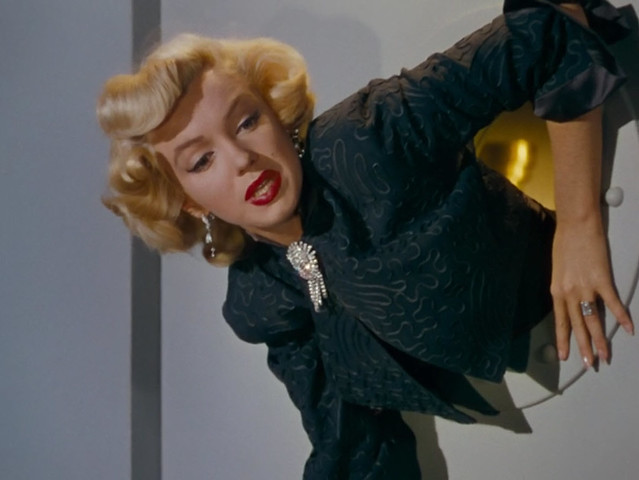
“Beat for beat, Gentlemen Prefer Blondes just might be the single funniest film I’ve ever covered for this column,” Caroline Siede writes in the latest entry for her ‘When Romance Met Comedy’ series at AV Club.
“So much of what makes the filmwork ultimately comes down to just how fantastic Monroe and Russell are in it, both individually and as a duo. Russell was the bigger star at the time and commanded the higher salary, but this is one of the key films that launched Monroe into the Hollywood stratosphere and established her signature ‘dumb blonde’ persona. I could fill this whole column just listing off the genius comedic scenarios that [Howard] Hawks and [Charles] Lederer dream up, and that Monroe and Russell flawlessly deliver. One of my favorites is a sequence where Lorelei tries to escape a locked room via a porthole window, which becomes a great showcase for Monroe’s pitch-perfect comedic timing and Hawks’ clever eye for physical comedy.
Lorelei’s obsession with diamonds is both a funny comedic runner and the film’s most pointed piece of satirical commentary. As Lorelei sees it, if the world is going to objectify her anyway, she might as well get some financial benefit from it—especially since she’s learned firsthand that diamonds won’t betray her in the way that men so often do.
Like the best satires, Gentlemen Prefer Blondes heightens cultural dynamics to the point where you can’t help but see the absurdity in them. Yet it does so in a way that always gives Lorelei and Dorothy the comedic upper hand, rather than forcing them to be the butt of the joke. Gentlemen Prefer Blondes imagines a world where women are allowed to be as open and unembarrassed about their desires as men—whether that’s Dorothy’s interest in ‘a beautiful hunk o’ man’ or Lorelei’s proclivity for wealthy beaus. They never waiver in their directness about asking for what they want, nor from their loyalty to one another. In the end, they’re rewarded for their ingenuity, not punished for it.
There’s a sort of loosely accepted myth that cultural progress is linear—that of course a movie made in 1953 would be more sexist than a movie made today. Yet once you lock into the satirical tone beneath its surface-level pleasures, Gentlemen Prefer Blondes refutes that idea in nearly every scene. It’s both an old-fashioned romp and a shockingly progressive ode to female independence, sexual agency, and camaraderie. Diamonds may be a girl’s best friend, but—as this romantic comedy sees it—so is the woman who will happily throw on her finest evening wear and upend the patriarchy with you.”